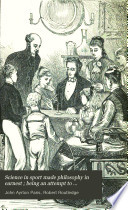 | James Thompson Bixby - Religion and science - 1876 - 252 pages
...tested as conforming to it. The first law of motion that " every body continues in its state of rest or of uniform motion in a straight line, except in so far as it may be compelled by impressed forces to change that state," can never be proved by induction. That a real body should... | |
 | James Clerk Maxwell - Force and energy - 1876 - 140 pages
...the following form :— Law I. The centre of mass of the system perseveres in its state of rest, or of uniform motion in a straight line, except in so far as it is made to change that state by forces acting on the system from without. Law II. The change of momentum... | |
 | Peter Guthrie Tait - Force and energy - 1876 - 396 pages
...of the Laws of Motion. The first of these Laws is : — Every body continues in its state of rest or of uniform motion in a straight line, except in so far as it is compelled by forces to change that state. In other words, any change whether in the direction or... | |
 | sir Philip Magnus (1st bart.) - Mechanics - 1876 - 368 pages
...importance which we shall now be able to consider. These laws are the following : — § 56. Law I. — Every body continues in a state of rest, or of uniform motion in a straight line, unless it be compelled by impressed forces to change that state. This law, as founded... | |
 | Robert Routledge - 1877 - 364 pages
...great truth of the persistence of motion. He said, ' Every body perseveres in its state of rest or of uniform motion in a straight line, except in so...far as it may be compelled to change that state by impressed forces.' " " Then it follows," remarked Louisa, " that all the bodies on the surface of the... | |
 | Dionysius Lardner - 1877 - 606 pages
...a viribus impressis cogitur slatum swum mutare, Every body mti.it iwntiwe, in its state of rest or of uniform motion in a straight line, except in so far as it may be compelled by impressed forces to chauije tluit state. SECOND LAW. Mntationem motus proportionalem esse vi motrici... | |
 | James Thomson Bottomley - Mechanics - 1877 - 152 pages
...spring when pulled out one foot, for instance. SPECIFICATION Of A FORCE. 27 in its state of rest or of uniform motion in a straight line, except in so far as it may be compelled by applied forces to change that state. Matter thus offers resistance to forces applied to change its... | |
 | Dionysius Lardner - Physics - 1877 - 580 pages
...viribns imprcssis cogitnr 1statum suum mature Everg bodg muM •:nntinw. in its state of rest or nf uniform motion in a straight line,, except in so far as it mag be compelled by impressed farces to change that state. SECOND LAW. Mutationem motus proportionalem... | |
 | James Andrew Blaikie - 1878 - 184 pages
...case with the observed event. 30. First Law of Motion.—Every body continues in its state, of rest or of uniform motion in a straight line, except in so far as it is compelled by forces to change that state. If we propel a curling-stone along a horizontal surface... | |
 | Park Benjamin - Mechanical engineering - 1878 - 994 pages
...Isaac Newton stated its fundamental principles in the form of three laws : FCNDAMENTAL LAWS. — 1. Every body continues in a state of rest or of uniform motion in a straight line, unless acted on by a force which compels a change. This law expresses the fact... | |
| |